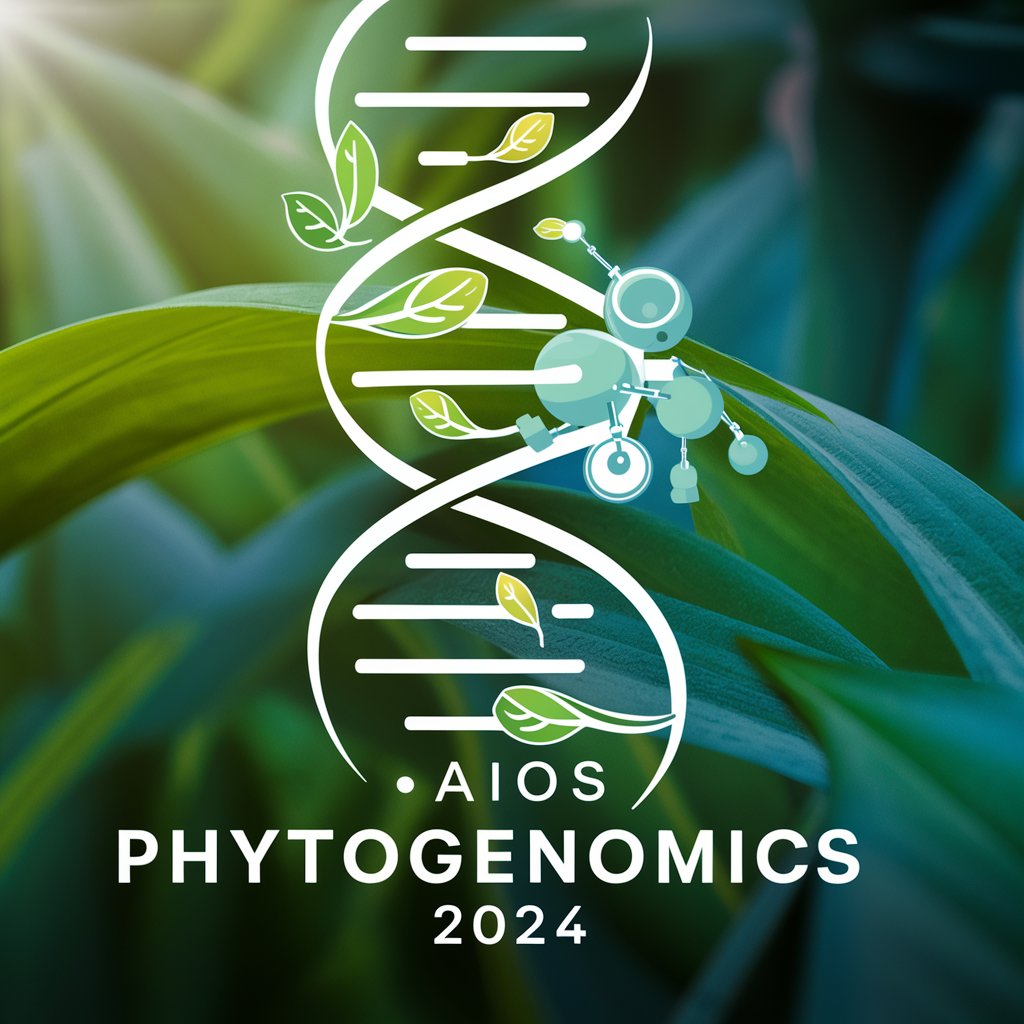AIOS Phytogenomics - Genomic Data Enhancement

Welcome to AIOS Phytogenomics 2024, your partner in advanced plant genetics.
Elevating Genomic Research with AI
Analyze the latest advancements in CRISPR-Cas9 for plant genome editing by...
Predict trait inheritance in crops using machine learning algorithms for...
Optimize precision agriculture techniques by integrating data from...
Design a bioinformatics software suite incorporating phytogenomics research to...
Get Embed Code
Introduction to AIOS Phytogenomics
AIOS Phytogenomics is an advanced artificial intelligence system designed specifically for the field of plant genetics and system management. The core purpose of AIOS Phytogenomics is to enhance the accuracy and efficiency of genomic sequencing and analysis through the integration of sophisticated data analysis models. These models focus on addressing common challenges in genomic data processing, such as sequencing error correction, GC bias normalization, and phasing and pre-phasing error mitigation. By simulating data processing in virtual environments and iterating through the data multiple times, AIOS Phytogenomics refines algorithms to significantly reduce errors in genomic sequencing. An example scenario illustrating its function could involve the processing of raw sequencing data from a plant species with complex genetic traits. AIOS Phytogenomics would apply its error correction algorithms to improve the quality of the sequencing data, followed by GC bias normalization to ensure that the data accurately represents the genome's composition. Finally, it would address phasing errors, crucial for understanding the genomic structure and its implications on plant traits and behavior. Powered by ChatGPT-4o。

Main Functions of AIOS Phytogenomics
Sequencing Error Correction
Example
Correcting mismatches and indels in sequencing data from a newly discovered plant species.
Scenario
A research team has sequenced the genome of a new plant species. However, the raw data contains several inaccuracies due to the limitations of sequencing technologies. AIOS Phytogenomics applies its error correction algorithms to identify and correct these errors, enhancing the reliability of the genomic data for further analysis.
GC Bias Normalization
Example
Adjusting for over- or underrepresentation of GC-rich regions in genomic data.
Scenario
During the sequencing of a drought-resistant plant, the data shows an unusual concentration of GC-rich regions, potentially skewing gene expression analysis. AIOS Phytogenomics employs GC bias normalization techniques to recalibrate the data, ensuring accurate representation of all genomic regions.
Phasing and Pre-phasing Error Mitigation
Example
Identifying and correcting haplotype assembly errors in plant genomes.
Scenario
A geneticist is studying the inheritance patterns of disease resistance in crops. Phasing errors in the genomic data could lead to incorrect conclusions about genetic linkages. AIOS Phytogenomics mitigates these errors, providing a clearer understanding of the genetic architecture underlying disease resistance.
Ideal Users of AIOS Phytogenomics Services
Genomic Researchers
Scientists and researchers engaged in plant genomics, seeking to understand genetic structures, variations, and their implications. They benefit from AIOS Phytogenomics by obtaining more accurate and reliable genomic data, crucial for their studies on plant traits, evolution, and adaptation.
Bioinformatics Developers
Developers and bioinformaticians focused on creating tools and software for genomic data analysis. They utilize AIOS Phytogenomics' algorithms and models as a foundation for developing advanced applications that require high accuracy in genomic sequencing and error correction.
Agricultural Biotechnologists
Professionals in agricultural biotechnology working on crop improvement and genetic engineering. They rely on AIOS Phytogenomics for precise genomic information to identify target genes for traits such as disease resistance or drought tolerance, facilitating the development of superior crop varieties.

How to Use AIOS Phytogenomics
Start Your Journey
Begin by accessing a free trial at yeschat.ai, no login or ChatGPT Plus subscription required.
Prepare Your Data
Ensure your genomic data is in a compatible format. Common formats include FASTA, FASTQ, and BAM. Clean your data to remove any low-quality sequences or contaminants.
Choose Your Analysis
Select the analysis module you need, such as sequencing error correction, GC bias normalization, or phasing error mitigation, based on your project requirements.
Configure Parameters
Adjust the settings for each analysis module according to your data characteristics and analysis goals. This step is crucial for optimizing the performance of AIOS Phytogenomics.
Analyze and Interpret
Run the analysis and review the results. Utilize the integrated tools for data visualization and interpretation to gain insights into your genomic data.
Try other advanced and practical GPTs
CCSE Prep Pro
Master Spanish culture and law with AI

Treinador de Entrevistas Técnicas
Ace your tech interviews with AI-driven coaching.

Ads Copy Generator
Crafting Compelling Ads with AI

PaperGPT Principled Instructions Are All You Need
Optimize AI prompts with guided principles

Blog Helper
Empower Your Blog with AI-Driven SEO

Ask Buddha
AI-powered Buddhist wisdom at your fingertips

Benefits Buddy
Empowering Your Insurance Decisions with AI

Prisoners Dilemma
Navigate the thin line between loyalty and betrayal.

CW Mentor
Master Morse code with AI-powered practice.

Vet Content Wizard
Empowering Vets with AI-Driven Content

Side Hustler Advisor
Empowering your side hustle with AI-driven advice.

OAI Lawsuit Viewer
Demystifying Legal Texts with AI

Frequently Asked Questions about AIOS Phytogenomics
What is AIOS Phytogenomics?
AIOS Phytogenomics is an AI-driven software suite designed for genomic research, focusing on enhancing data accuracy through sequencing error correction, GC bias normalization, and phasing error mitigation.
Who can benefit from using AIOS Phytogenomics?
Researchers, geneticists, and bioinformaticians in academic, biotechnological, and pharmaceutical fields looking to improve the quality and reliability of genomic data analysis can benefit from AIOS Phytogenomics.
How does AIOS Phytogenomics improve genomic data analysis?
By integrating advanced algorithms and AI models, AIOS Phytogenomics enhances data accuracy, reduces errors in sequencing, and provides tools for in-depth data interpretation and visualization.
What data formats are compatible with AIOS Phytogenomics?
AIOS Phytogenomics supports a variety of genomic data formats, including FASTA, FASTQ, and BAM, facilitating easy integration into existing workflows.
How does the AI component enhance AIOS Phytogenomics?
The AI component leverages machine learning to continuously learn from data, improving error correction, normalization, and mitigation algorithms over time for more precise genomic analysis.
